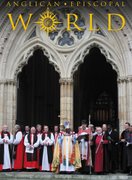 Many years ago, one Easter Sunday morning when my husband and I lived in Barboursville, W.Va., and had a small three year old son, a young neighbor girl of ours paid us a Sunday visit. She was dressed in a simple pastel dress, was wearing matching heels and short white gloves. She was also carrying her Bible and had just come from church.
Many years ago, one Easter Sunday morning when my husband and I lived in Barboursville, W.Va., and had a small three year old son, a young neighbor girl of ours paid us a Sunday visit. She was dressed in a simple pastel dress, was wearing matching heels and short white gloves. She was also carrying her Bible and had just come from church.
She came by to wish us a happy Easter. She was warm and her intentions filled our life with her sweetness for a while on that Spring day. We were away from family and friends, having moved to a new home in a faraway place. We were touched and reassured by her gentle presence.
I have often wondered, if I could do my life over again, just what one thing would I change? My answer, and it always remains the same as I ponder the thought: I would learn to be more of a "lady." To have more manners, to be more thoughtful, more serene, and polite. I would enjoy even more the feminine things: dresses, babies, flowers, scents, giggles, and a lightness of being. I would not want to be one of those "as-if" ladies who wear their appearance of femininity as a mask for a heartless drive to power. I'd just want to be softer and lighter, more serene and gracious than I am, like the young girl that Easter morning.
These days I enjoy seeing these traits develop in my granddaughters in the encouraging arms of their mother. She carefully does their little nails and puts the matching bows in their hair. She insists that they mind their manners and learn to share. She always speaks well of them and offers a gentle embrace. Today's blog is to honor young ladies, their beauty, innocence and joy of life.
I pray that the world will become safer for them all.

.
.
.
.
THE MAY QUEEN by ALFRED LORD TENNYSON
You must wake and call me early, call me early, mother dear;
To-morrow ’ill be the happiest time of all the glad New-year;
Of all the glad New-year, mother, the maddest merriest day,
For I’m to be Queen o’ the May, mother, I’m to be Queen o’ the May.
Little Effie shall go with me to-morrow to the green,
And you’ll be there, too, mother, to see me made the Queen;
For the shepherd lads on every side ’ill come from far away,
And I’m to be Queen o’ the May, mother, I’m to be Queen o’ the May.
The honeysuckle round the porch has woven its wavy bowers,And by the meadow-trenches blow the faint sweet cuckoo-flowers;
And the wild marsh-marigold shines like fire in swamps and hollows gray,
And I’m to be Queen o’ the May, mother, I’m to be Queen o’ the May.
The night-winds come and go, mother, upon the meadow-grass,
And the happy stars above them seem to brighten as they pass;
There will not be a drop of rain the whole of the livelong day,
And I’m to be Queen o’ the May, mother, I’m to be Queen o’ the May.
All the valley, mother, ’ill be fresh and green and still,
And the cowslip and the crowfoot are over all the hill,
And the rivulet in the flowery dale ’ill merrily glance and play,
For I’m to be Queen o’ the May, mother, I’m to be Queen o’ the May.
So you must wake and call me early, call me early, mother dear,To-morrow ’ill be the happiest time of all the glad New-year;
To-morrow ’ill be of all the year the maddest merriest day,
For I’m to be Queen o’ the May, mother, I’m to be Queen o’ the May.
 I am the ship,
I am the ship, .jpg)












































